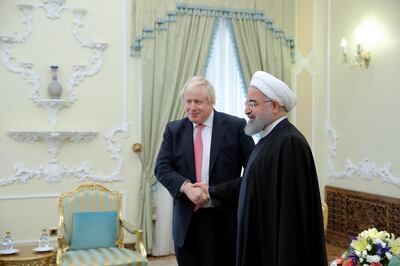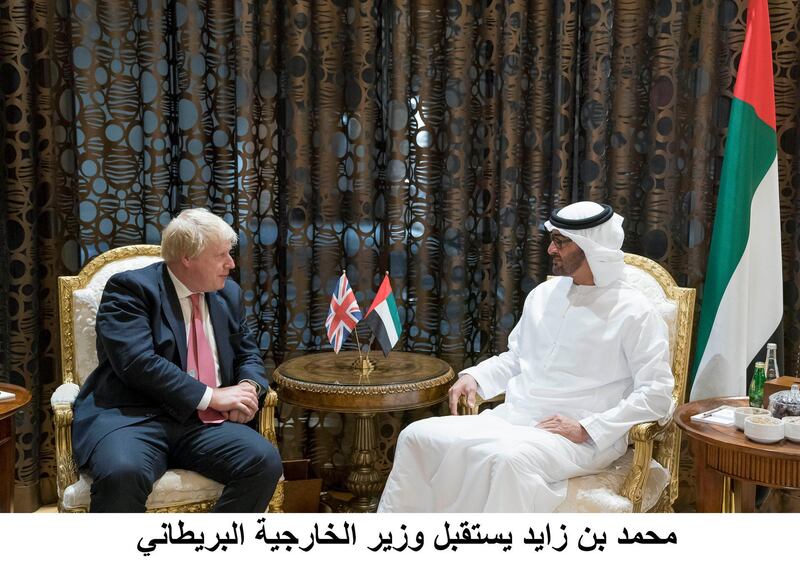Sheikh Mohammed bin Zayed held talks with British foreign secretary Boris Johnson in Abu Dhabi on Sunday, with the two men discussing joint co-ordination on addressing terrorism, extremism and violence and bringing about stability in the region.
The Crown Prince of Abu Dhabi and Deputy Supreme Commander of the UAE Armed Forces and Mr Johnson also discussed ways of bolstering UAE-UK ties during the meeting at Al Shati Palace, state news agency Wam reported.
The foreign secretary arrived in Abu Dhabi on Sunday from Iran. Earlier in the day Mr Johnson held talks with the Iranian president during a visit dominated by the case of the jailed British aid worker and mother Nazanin Zaghari-Ratcliffe.
A court hearing scheduled for Sunday in which Mrs Zaghari-Ratcliffe was expected to have her jail sentence extended was postponed following Mr Johnson's visit, campaigners said.
The Free Nazanin Campaign said her case was now on hold.
In a statement released by her family, Mrs Zaghari-Ratcliffe said: “Is there light at the end of the tunnel? I can see some light today, more than before. Having no court suddenly. It feels like God is protecting me. Can you please continue to pray.”
Her husband Richard Ratcliffe added: "This weekend we had our first ripple of freedom".
Mr Johnson spent an hour with Iranian president Hassan Rouhani on Sunday, in a meeting described as "worthwhile" by a foreign office spokesman.

"During nearly an hour of talks with president Rouhani, both spoke forthrightly about the obstacles in the relationship,” the spokesman said.
He added that both men had “agreed on the need to make progress in all areas”.
Mr Johnson is under intense pressure to secure the release of Mrs Zaghari-Ratcliffe, after he wrongly said that she had travelled to Iran to “train journalists” — a comment that led to threats to increase her jail sentence.
Mrs Zaghari-Ratcliffe is currently serving a five-year sentence for allegedly plotting the "soft toppling" of Iran's government while travelling there with her toddler daughter.
It had been feared that she could see her sentence increased by up to 16 years if Sunday's court case had gone ahead.
_______________
Read more:
Boris Johnson holds ‘frank’ talks with Iran minister about jailed British mother
Nazanin release: husband on ‘tenterhooks’ about Boris visit to Iran
Boris Johnson to raise Iranian dual national's release during Middle East trip
_______________
Ahead of his visit to Iran, Mr Johnson had spoken of his desire to secure the release of Mrs Zaghari-Ratcliffe and other dual British-Iranian nationals being held in Iran. “We will … discuss our bilateral relationship and I will stress my grave concerns about our dual national consular cases and press for their release where there are humanitarian grounds to do so.”
After the meeting with Mr Rouhani, Mr Johnson's spokesman said: “We leave with a sense that both sides want to keep up the momentum to resolve the difficult issues in the bilateral relationship and preserve the nuclear deal."
However, no announcement was made on Mrs Zaghari-Ratcliffe’s possible release.
Mr Johnson had also held “constructive” talks with his Iranian counterpart on Saturday, where the plight of the jailed aid worker was again discussed.
In a two-hour meeting with Iranian foreign minister Mohammed Javad Zarif, Mr Johnson touched on a number of different areas, including his “concerns about the consular cases of British-Iranian dual nationals”, a foreign office statement said.
As the British foreign secretary flew into Iran, Mr Ratcliffe talked of his anxiety about the chances for his spouse’s release.
“I’m waiting on tenterhooks — biting my nails,” he said.
Mr Ratcliffe said the foreign secretary had been hoping to visit Mrs Zaghari-Ratcliffe in jail, although it was not clear whether Mr Johnson had managed to do that.
Mr Ratcliffe last spoke to his wife by phone on Tuesday, when she had been “genuinely worried about the court case and getting quite agitated”.
Hopes for Mrs Zaghari-Ratcliffe’s early release rose earlier this month when it emerged an Iranian government medic was to make checks on her mental health after claims she has been suffering panic attacks, depression and suicidal thoughts. She has also had a cancer scare.
However, the foreign secretary had said he was not anticipating an immediate breakthrough in the case. As part of the trip he was expected to attempt to settle a long-running £400 million dispute which could help secure Mrs Zaghari-Ratcliffe’s freedom.
Other issues discussed during his trip included the need to preserve the Iran nuclear deal, the foreign office added.
Mr Johnson met with Ali Akbar Salehi, the head of Iran's nuclear programme, earlier on Sunday.






